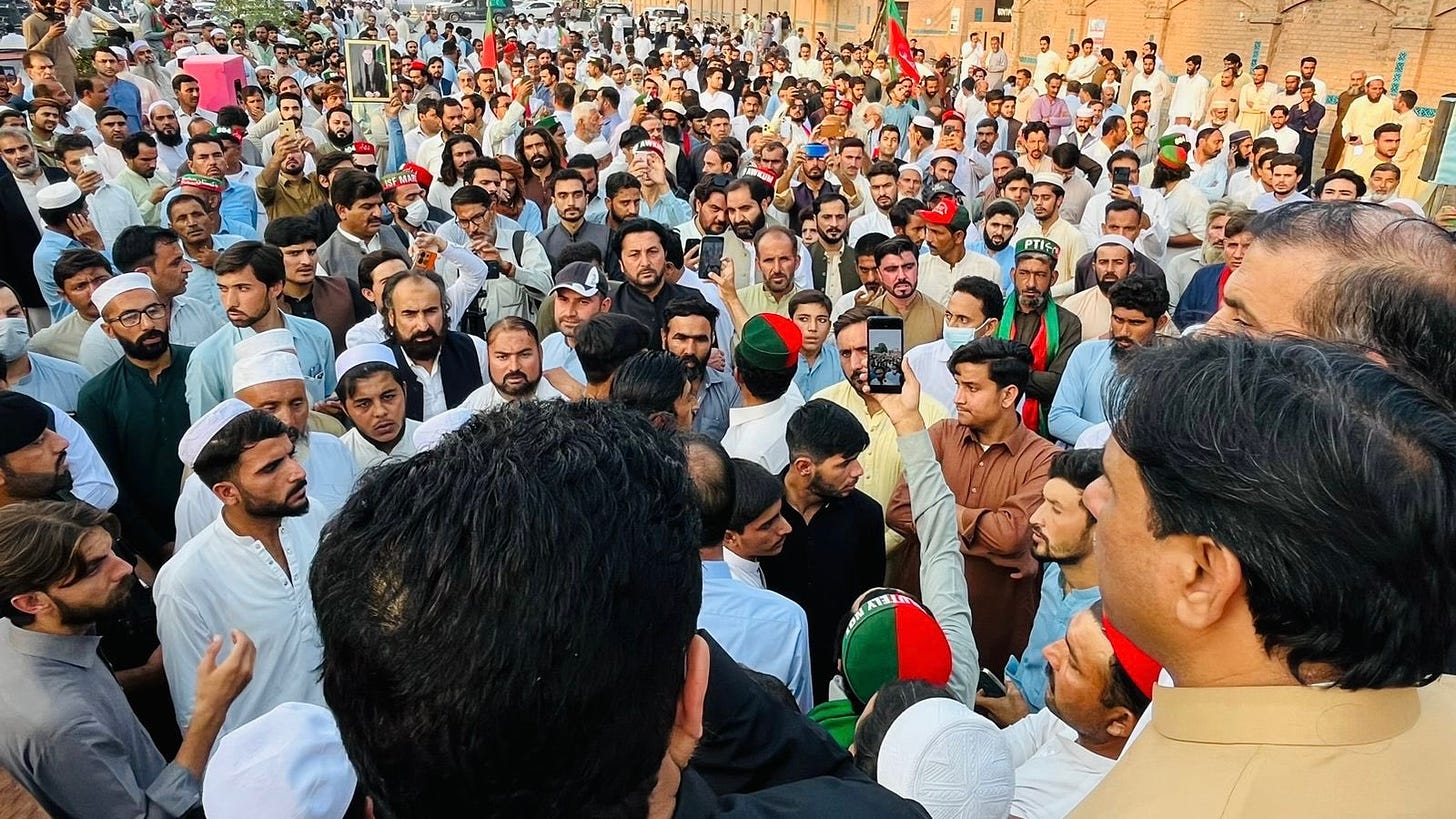Crackdown on Protests in Pakistan
Thousands March in Protest Over Controversial Constitutional Amendments
On Friday 18 October, hundreds of members of Pakistan Tehreek-e-Insaf (PTI), Pakistan’s largest opposition party, were arrested in order to thwart its call for a nationwide protest against Shehbaz Sharif government’s proposed constitutional amendments and demanding release of its incarcerated leader and former prime minister Imran Khan.
The provincial government of Punjab had banned all public gatherings and shut down all educational institutions in the state following the protest call claiming it feared deterioration of the law and order situation. Though the administration denied the imposition of ban on protests is solely related to PTI’s call, according to Dawn, in the last few months, the federal and Punjab governments have repeatedly issued ban orders whenever PTI has given a call.
PTI workers were able to hold small gatherings at different venues across the country on Friday despite the ban and crackdown by the state. The ban was effective for two days, Friday and Saturday.
The PTI and most of the opposition parties are opposing the 26th constitutional amendments which are mainly focused on the increased control of the government over the country’s judiciary, including fixing the tenure of the justices of Pakistan Supreme court for three years and formation of a distinct federal constitutional court.
The proposed amendments also include provisions proposing an individual legislator can defy the party line while voting in the parliament.
The opposition claims the so-called “constitutional package” is unconstitutional and is not based on consensus. PTI has also claimed it is precisely designed to hurt the party after the establishment has repeatedly failed to control its rise and even failed to ban it.
Earlier this year, the Pakistan Muslim League-Nawaz (PML-N) and Pakistan Peoples Party (PPP) led government in Pakistan announced it was thinking of banning PTI claiming it was impossible to work with the party. It backed out after facing strong reaction from opposition parties and civil society movements in the country.
State’s pressuring of parliamentarians
Opposition members in Pakistan have alleged that the government is trying to coerce members of the National Assembly, to force them to vote in favor of the amendments.
The Sharif government has been trying to present the amendment bill in the parliament since last month but has failed to do so as it requires at least two-third majority in both the chambers of the parliament to pass.
The PML-N and PPP-led government would need 224 votes in the 336-seat National Assembly, the lower chamber and 64 votes in the Senate in order for the amendments to be adopted. However, it currently enjoys the support of just 214 votes in the National Assembly and 57 votes in the Senate and needs the support from other parties.
PTI claimed on Thursday that the police have allegedly intimidated family members of one of its MNAs to force him to vote in favor of the proposed amendment bill. It also claimed that the government is offering bribes to some of its MNAs to switch sides.
According to the media reports, police have raided houses of some opposition MNAs even harassing their family members to force them to vote in the government’s favor. MNA from Balochistan National Party (BNP) Akhtar Mengal had to resign his membership allegedly due to the growing pressure from the authorities. On Friday, he alleged that two more MNAs from his party are facing similar pressure and may resign soon.
Ammar Ali Jan, head of the Haqooq-e-Khalq party, criticized the government’s maneuvers which seek to win the support of the majority, claiming such tactics would create more “chaos and instability” in the country already facing many political and economic issues.
Pakistan’s economy is still grappling with the after effects of COVID-19 and devastating floods in 2022. The IMF loan deal which was supposed to provide relief has so far failed to do so. Common Pakistanis are instead still struggling with the rise in prices of basic commodities and services and lack of employment.
The continued incarceration of former prime minister Imran Khan and repeated confrontations between his party PTI and the government is fueling political instability with the government refusing to release Khan despite widespread assumption that most of the charges against him are politically motivated.
The government has instead crackdown on the opposition. Apart from attempting the ban on PTI, it recently banned Pashtun Tahafuz Movement (PTM) a peaceful group fighting against the human rights violations and forced disappearances in the Pashtun dominated regions of the country. The government has increased its attacks on other civil society organizations and left movements while it remains unable to control the rising militancy in the country.




